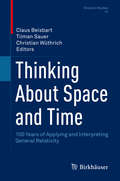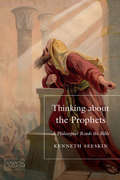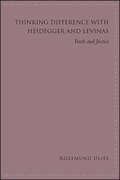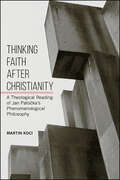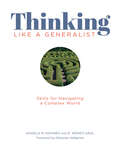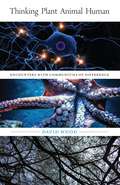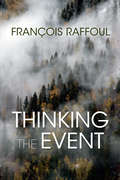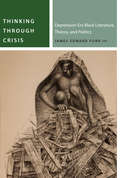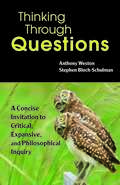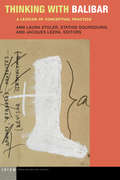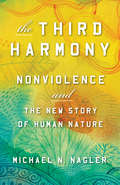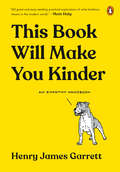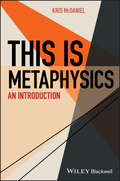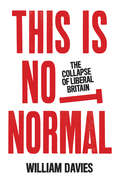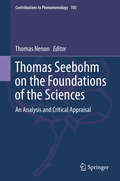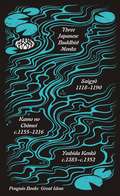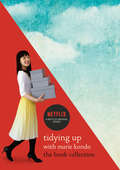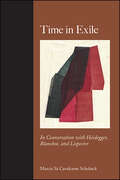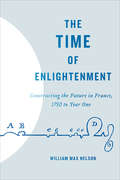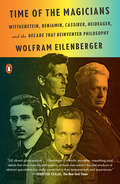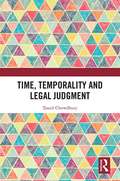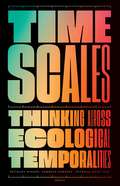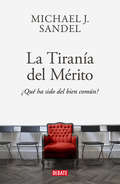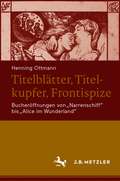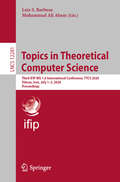- Table View
- List View
Thinking About Space and Time: 100 Years of Applying and Interpreting General Relativity (Einstein Studies #15)
by Claus Beisbart Tilman Sauer Christian WüthrichThis volume offers an integrated understanding of how the theory of general relativity gained momentum after Einstein had formulated it in 1915. Chapters focus on the early reception of the theory in physics and philosophy and on the systematic questions that emerged shortly after Einstein's momentous discovery. They are written by physicists, historians of science, and philosophers, and were originally presented at the conference titled Thinking About Space and Time: 100 Years of Applying and Interpreting General Relativity, held at the University of Bern from September 12-14, 2017. By establishing the historical context first, and then moving into more philosophical chapters, this volume will provide readers with a more complete understanding of early applications of general relativity (e.g., to cosmology) and of related philosophical issues. Because the chapters are often cross-disciplinary, they cover a wide variety of topics related to the general theory of relativity. These include:Heuristics used in the discovery of general relativityMach's PrincipleThe structure of Einstein's theoryCosmology and the Einstein worldStability of cosmological modelsThe metaphysical nature of spacetimeThe relationship between spacetime and dynamicsThe Geodesic PrincipleSymmetriesThinking About Space and Time will be a valuable resource for historians of science and philosophers who seek a deeper knowledge of the (early and later) uses of general relativity, as well as for physicists and mathematicians interested in exploring the wider historical and philosophical context of Einstein's theory.
Thinking about the Prophets: A Philosopher Reads the Bible (JPS Essential Judaism)
by Kenneth SeeskinRethinking the great literary prophets whose ministry ran from the eighth to the sixth centuries BCE—Amos, Hosea, First Isaiah, Jeremiah, Ezekiel, Second Isaiah, and Job—Thinking about the Prophets examines their often-shocking teachings in light of their times, their influence on later Western and Jewish thinkers, and their enduring lessons for all of us. As a noted scholar of Jewish philosophy, Kenneth Seeskin teases out philosophical, ethical, and theological questions in the writings, such as the nature of moral reasoning, the divine persona, divine providence, the suffering of the innocent, the power of repentance, and what it means to believe in a monotheistic conception of God. Seeskin demonstrates that great ideas are not limited by time or place, but rather once put forth, take on a life of their own. Thus he interweaves the medieval and modern philosophers Maimonides, Kant, Cohen, Buber, Levinas, Heschel, and Soloveitchik, all of whom read the prophets and had important things to say as a result. We come to see the prophets perhaps in equal measure as divinely authorized whistle-blowers and profound thinkers of the human condition. Readers of all levels will find this volume an accessible and provoking introduction to the enduring significance of biblical prophecy.
Thinking Difference with Heidegger and Levinas: Truth and Justice (SUNY series in Contemporary French Thought)
by Rozemund UljéeTracing the relationship between truth and justice as articulated by Heidegger and Levinas, Rozemund Uljée presents the relation between the two thinkers as a subtle, profound, and complex rapport, which includes both their proximity and radical difference. This rapport is conceived not as a confrontation, but rather as a transformation, as Levinas's notion of justice does not renounce Heidegger's account of truth and its deployment. Thinking Difference with Heidegger and Levinas shows how the ethical relation transforms the essence and task of philosophy in its entirety, since it shifts the orientation of philosophy and the task of thinking from its concern with truth as ground or foundation to a question of justice. As a result, philosophy is no longer riveted to Being and its truth, but answers to the call for justice and must be conceived of as infinite commencement, where its impossibility to totalize meaning ensures that it remains open to the alterity of transcendence.
Thinking Faith after Christianity: A Theological Reading of Jan Patočka's Phenomenological Philosophy (SUNY series in Theology and Continental Thought)
by Martin KociWinner of the 2020 Emerging Scholar’s Theological Book Prize presented by the European Society for Catholic TheologyThis book examines the work of Czech philosopher Jan Patočka from the largely neglected perspective of religion. Patočka is known primarily for his work in phenomenology and ancient Greek philosophy, and also as a civil rights activist and critic of modernity. In this book, Martin Koci shows Patočka also maintained a persistent and increasing interest in Christianity. Thinking Faith after Christianity examines the theological motifs in Patočka's work and brings his thought into discussion with recent developments in phenomenology, making a case for Patočka as a forerunner to what has become known as the theological turn in continental philosophy. Koci systematically examines his thoughts on the relationship between theology and philosophy, and his perennial struggle with the idea of crisis. For Patočka, modernity, metaphysics, and Christianity were all in different kinds of crises, and Koci demonstrates how his work responded to those crises creatively, providing new insights on theology understood as the task of thinking and living transcendence in a problematic world. It perceives the un-thought element of Christianity—what Patočka identified as its greatest resource and potential—not as a weakness, but as a credible way to ponder Christian faith and the Christian mode of existence after the proclaimed death of God and the end of metaphysics.
Thinking Like a Generalist: Skills for Navigating a Complex World
by Angela Kohnen Wendy SaulWhat can we teach kids today that will have utility ten or fifteen years from now? Angela Kohnen and Wendy Saul propose an approach to information literacy that goes beyond the teaching of discreet, easily outdated skills. Instead they use activity to help students build identities as curious individuals empowered to ask their own questions and able to navigate their information-filled world in pursuit of credible answers. A generalist is curious, open-minded, skeptical, and persistent in their quest for information. Thinking Like a Generalist: Skills for Navigating a Complex World demonstrates what it means to take a generalist stance in instruction and provides a set of teaching tools to be able to pass those skills to students'sskills that will transfer beyond the walls of the classroom. Inside you'll find the following: A thorough introduction to what it means to be a generalist, and how to develop the practices and tools that help generalists navigate the world we live inA focus on the teacher becoming a generalist and tips for modeling those practices in the classroomDetailed instructions on how to write a unit of study that emphasizes generalist literacy skills and includes an overview and examples of five different unitsHow to use the authors' read-aloud-think-aloud strategy to orient students to generalist tools and practicesThe ideas, strategies, and examples Thinking Like a Generalist will give you the tools to think like a generalist and then pass that knowledge on to your students, guiding them to become inquisitive, lifelong learners and preparing them for a future that we can't yet imagine.
Thinking Plant Animal Human: Encounters with Communities of Difference (Posthumanities #56)
by David WoodCollected essays by a leading philosopher situating the question of the animal in the broader context of a relational ontology There is a revolution under way in our thinking about animals and, indeed, life in general, particularly in the West. The very words man, animal, and life have turned into flimsy conceptual husks—impediments to thinking about the issues in which they are embroiled. David Wood was a founding member of the early 1970s Oxford Group of philosophers promoting animal rights; he also directed Ecology Action (UK). Thinking Plant Animal Human is the first collection of this major philosopher&’s influential essays on &“animals,&” bringing together his many discussions of nonhuman life, including the classic &“Thinking with Cats.&”Exploring our connections with cats, goats, and sand crabs, Thinking Plant Animal Human introduces the idea of &“kinnibalism&” (the eating of mammals is eating our own kin), reflects on the idea of homo sapiens, and explores the place of animals both in art and in children&’s stories. Finally, and with a special focus on trees, the book delves into remarkable contemporary efforts to rescue plants from philosophical neglect and to rethink and reevaluate their status. Repeatedly bubbling to the surface is the remarkable strangeness of other forms of life, a strangeness that extends to the human. Wood shows that the best way of resisting simplistic classification is to attend to our manifold relationships with other living beings. It is not anthropocentric to focus on such relationships; they cast light in complex ways on the living communities of which we are part, and exploring them recoils profoundly on our understanding of ourselves.
Thinking the Event (Studies in Continental Thought)
by François RaffoulThe author of The Origins of Responsibility presents &“a major contribution to philosophical scholarship on . . . the very idea of the event&” (Edward S. Casey, author of The World on Edge). In Thinking the Event, continental philosopher François Raffoul explores the question of what constitutes an event as an event: not what happens or why it happens, but what &“happening&” means. If it&’s true that nothing happens without a reason, as Leibniz famously posited, then does this principle of reason have a reason? Bringing together philosophical insights from Martin Heidegger, Jacques Derrida, Jean-Luc Nancy, and Jean-Luc Marion, Raffoul shows how the event, in its disruptive unpredictability, always exceeds causality, subjectivity, and reason. He then goes on to examine the inappropriability of this &“pure event&” and how this inappropriability may inform ethical and political considerations. In the wake of the exhaustion of traditional metaphysics, the notion of the event comes to the fore, with key implications for philosophy, ontology, ethics, and theories of selfhood. Raffoul&’s Thinking the Event is essential reading on this fascinating topic.
Thinking Through Crisis: Depression-Era Black Literature, Theory, and Politics (Commonalities)
by James Edward Ford IIIIn Thinking Through Crisis, James Edward Ford III examines the works of Richard Wright, Ida B. Wells, W. E. B. Du Bois, Zora Neale Hurston, and Langston Hughes during the 1930s in order to articulate a materialist theory of trauma. Ford highlights the dark proletariat’s emergence from the multitude apposite to white supremacist agendas. In these works, Ford argues, proletarian, modernist, and surrealist aesthetics transform fugitive slaves, sharecroppers, leased convicts, levee workers, and activist intellectuals into protagonists of anti-racist and anti-capitalist movements in the United States.Thinking Through Crisis intervenes in debates on the 1930s, radical subjectivity, and states of emergency. It will be of interest to scholars of American literature, African American literature, proletarian literature, black studies, trauma theory, and political theory.
Thinking Through Questions: A Concise Invitation to Critical, Expansive, and Philosophical Inquiry
by Anthony Weston Stephen Bloch-SchulmanThinking Through Questions is an accessible and compact guide to the art of questioning, covering both the use and abuse of questions. Animated by wide-ranging and engaging exercises and examples, the book helps students deepen their understanding of how questions work and what questions do, and builds the skills needed to ask better questions. Cowritten by two of today's leading philosopher-teachers, Thinking Through Questions is specifically designed to complement, connect, and motivate today&’s standard curricula, especially for classes in critical thinking, philosophical questioning, and creative problem- solving (called here "expansive questioning"). Offering students a wide and appreciative look at questions and questioning, this small book will also appeal to faculty and students across the disciplines: in college writing courses, creativity workshops, education schools, introductions to college thinking, design thinking projects, and humanities and thinking classes. Open-ended, creative, and critically self-possessed thinking is its constant theme—what field doesn&’t need more of that?
Thinking with Balibar: A Lexicon of Conceptual Practice (Idiom: Inventing Writing Theory)
by Emily Apter Étienne Balibar J. M. Bernstein Judith Butler Monique David-Ménard Hanan Elsayed Didier Fassin Stathis Gourgouris Bernard Harcourt Jacques Lezra Patrice Maniglier Warren Montag Adi Ophir Bruce Robbins Ann Laura Stoler Gary WilderThis volume, the first sustained critical work on the French political philosopher Étienne Balibar, collects essays by sixteen prominent philosophers, psychoanalysts, anthropologists, sociologists, and literary critics who each identify, define, and explore a central concept in Balibar’s thought. The result is a hybrid lexicon-engagement that makes clear the depth and importance of Balibar’s contribution to the most urgent topics in contemporary thought. The book shows the continuing vitality of materialist thought across the humanities and social sciences and will be fundamental for understanding the philosophical bases of the contemporary left critique of globalization, neoliberalism, and the articulation of race, racism, and economic exploitation.Contributors: Emily Apter, Étienne Balbar, J. M. Bernstein, Judith Butler, Monique David-Ménard, Hanan Elsayed, Didier Fassin, Stathis Gourgouris, Bernard E. Harcourt, Jacques Lezra, Patrice Maniglier, Warren Montag, Adi Ophir, Bruce Robbins, Ann Laura Stoler, Gary Wilder
The Third Harmony: Nonviolence and the New Story of Human Nature
by Michael N Nagler , Ph.D.In the latest fruit of a brilliant career, Michael Nagler argues that nonviolence—not just as a tactic but as a way of being—is the only way to unite deeply divided people and enable progressive movements and leaders of all stripes to fulfil their promise and potential.So many of the problems that beset us—war, poverty, isolation, and the climate crisis—have their roots in an old story about the universe: we are purposeless matter in a random void, and scarcity, competition, and violence are inevitable. Citing the convergence of modern science and the essence of the world's wisdom traditions, Michael Nagler argues for a new story: the universe is conscious and purposeful, humans are spiritual beings, and cooperation and collaboration are our natural way of interacting. This "new story" has had other champions, but Nagler is the first to realize that a piece is missing. For the new story to take hold, we have to embrace nonviolence, not only as a social change tactic but as a way of life. Nonviolence is the only power strong enough to "move the heart" toward this deep and revolutionary change in worldview. Nagler refers to this as the "third harmony," which is the harmony within and among us to resolve the crisis of the human image. Calling on us to realize the urgency of nonviolence for resolving our personal and collective problems, Nagler focuses on how to shift to our story on a personal, everyday level and then integrate it into the very foundations of our understanding of humanity and community, for our sake, for the sake of future generations, and the sake of nonviolence itself.
This Book Will Make You Kinder: An Empathy Handbook
by Henry James GarrettFrom the creator of Drawings of Dogs, a warmly illustrated and thoughtful examination of empathy and the necessity of being kinderThe kindness we owe one another goes far beyond the everyday gestures of feeding someone else's parking meter--although it's important not to downplay those small acts. Kindness can also mean much more. In this timely, insightful guide, Henry James Garrett lays out the case for developing a strong, courageous, moral kindness, one that will help you fight cruelty and make the world a more empathetic place.So, how could a book possibly make you kinder? It would need to answer two questions: • Why are you kind at all? and, • Why aren't you kinder?In these pages, building on his academic studies in metaethics and using his signature-sweet animal cartoons, Henry James Garrett sets out to do just that, exploring the sources and the limitations of human empathy and the many ways, big and small, that we can work toward being our best and kindest selves for the people around us and the society we need to build.
This Is Metaphysics: An Introduction (This is Philosophy)
by Kris McDanielMetaphysics—the philosophical study of the nature of reality—is a dynamic sub-field which encompasses many of the most fundamental and elusive questions in contemporary analytic philosophy. A concise and focused introduction to contemporary metaphysics, This is Metaphysics: An Introduction takes readers with minimal technical knowledge of the field on a guided tour of the intellectual landscape of the discipline. Approachable and engaging, the book covers a broad range of key topics and principles in metaphysics, including classification, the nature and existence of properties, ontology, the nature of possibility and necessity, and fundamental questions concerning being and existence. Each chapter challenges readers to grapple with thought-provoking examples that build upon the seminal theoretical contributions of contemporary metaphysicians like Peter van Inwagen and David Lewis, and concludes with a “Doing Metaphysics” section encouraging readers to think through substantive metaphysical questions while weighing possible arguments and objections. A thoughtful and comprehensive introduction provides a framework for author Kris McDaniel’s pedagogical approach, and each section incorporates multi-platform online resources and plentiful footnotes to support further reading and deeper conceptual engagement. A welcome addition to the popular This is Philosophy series, This is Metaphysics is a reader-friendly survey of metaphysics for philosophy majors, undergraduates in introductory philosophy courses, and curious members of the general public interested in investigating this expansive and enigmatic area of study.
This is Not Normal: The Collapse of Liberal Britain
by William DaviesWhat just happened and how did we get into this mess?Since 2016, the UK has been in a crisis of its own making: but this is not the fault of Brexit but of a larger problem of our politics. The status of political parties, the mainstream media, public experts and officials have all been disrupted. Along the way, there have been shocking and exhilarating events: the unforeseen 2017 election result, the horrific details of Grenfell Tower and the Windrush scandal, the sudden rise and fall of the Brexit Party.As the 'mainstream' of politics and media has come under attack, the basic norms of public life have been thrown into question.This Is Not Normal takes stock of a historical moment that no longer recognises itself. Davies tells a story of the apparently chaotic and irrational events, and extracts their underlying logic and long-term causes. What we are seeing is the effects of the 2008 financial crash, the failure of the British neoliberal project, the dying of Empire, and the impact of the changes that technology and communications have had on the idea of the public sphere as well as the power of information. This is an essential book for anyone who wants to make sense of this current moment.
Thomas Seebohm on the Foundations of the Sciences: An Analysis and Critical Appraisal (Contributions to Phenomenology #105)
by Thomas NenonThis book explores the work of Thomas Seebohm (1934-2014), a leading phenomenologist and hermeneuticist. It features papers that offer a critical and constructive dialogue about Seebohm’s analyses and their implications for the sciences. The net result is an in-depth study and a helpful overview of Seebohm’s general approach and his specific views on various areas of modern science. The contributors focus especially upon his final text, History as a Science and the System of the Sciences. They view this as the culmination and summary of his historical and phenomenological investigations into the foundations, nature, and limits of modern sciences. This includes not just history but the Geisteswissenschaften more generally, along with the social and natural sciences as well. The essays in this volume reflect that range. This volume presents insightful discussions about the nature and legitimacy of the human sciences as sciences and the unique character of the social sciences. It will be of interest not just as a matter of historical scholarship, but also and above all as an important contribution to phenomenology and to the philosophy of science and the sciences as such. It deserves attention by scholars from any philosophical tradition interested in thinking about the foundations of their disciplines and a philosophy of science that includes, but is not limited to, the natural sciences.
Three Japanese Buddhist Monks (Penguin Great Ideas)
by Saigyo Kamo no Chomei Yoshida Kenko'I have relinquished all that ties me to the world, but the one thing that still haunts me is the beauty of the sky'These simple, inspiring writings by three medieval Buddhist monks offer peace and wisdom amid the world's uncertainties, and are an invitation to relinquish earthly desires and instead taste life in the moment.One of twenty new books in the bestselling Penguin Great Ideas series. This new selection showcases a diverse list of thinkers who have helped shape our world today, from anarchists to stoics, feminists to prophets, satirists to Zen Buddhists.
Tidying Up with Marie Kondo: The Life-Changing Magic of Tidying Up and Spark Joy
by Marie KondoDiscover the books that inspired the Netflix phenomenon Tidying Up with Marie Kondo, now together in a convenient ebook bundle: The Life-Changing Magic of Tidying Up and Spark Joy.Japanese decluttering expert Marie Kondo has taken the world by storm with her Netflix show, Tidying Up with Marie Kondo. Now fans can get the two books that started the movement, The Life-Changing Magic of Tidying Up and Spark Joy, in one ebook bundle that combines this philosophical wisdom, practical advice, and charming prescriptive illustrations into one master class. The Life-Changing Magic of Tidying Up is Kondo&’s guide to decluttering your home using her famed KonMari Method, and Spark Joy is an illustrated manual with step-by-step instructions for folding clothes and tackling messy areas of the home. With these two books, you can capture the joy of Marie Kondo&’s tidy lifestyle for yourself.
Time in Exile: In Conversation with Heidegger, Blanchot, and Lispector (SUNY series, Intersections: Philosophy and Critical Theory)
by Marcia Sá Cavalcante SchubackThis book is a philosophical reflection on the experience of time from within exile. Its focus on temporality is unique, as most literature on exile focuses on the experience of space, as exile involves dislocation, and moods of nostalgia and utopia. Marcia Sá Cavalcante Schuback proposes that in exile, time is experienced neither as longing back to the lost past nor as wanting a future to come but rather as a present without anchors or supports. She articulates this present as a "gerundive" mode, in which the one who is in exile discovers herself simply being, exposed to the uncanny experience of having lost the past and not having a future. To explore this, she establishes a conversation among three authors whose work has exemplified this sense of gerundive time: the German philosopher Martin Heidegger, the French writer and essayist Maurice Blanchot, and the Brazilian writer Clarice Lispector. The book does not aim to discuss how these authors understand the relation between time and exile, but presents a conversation with them in relation to this question that reflects new aspects in their work. Attempting to think and express this difficult sense of time from within exile, Time in Exile engages with the relation between thought and language, and between philosophy and literature. Departing from concrete existential questions, Sá Cavalcante Schuback reveals new philosophical and theoretical modes to understand what it means to be present in times of exile.
The Time of Enlightenment: Constructing the Future in France, 1750 to Year One
by William Max NelsonA new idea of the future emerged in eighteenth-century France. With the development of modern biological, economic, and social engineering, the future transformed from being predetermined and beyond significant human intervention into something that could be dramatically affected through actions in the present. The Time of Enlightenment argues that specific mechanisms for constructing the future first arose through the development of practices and instruments aimed at countering degeneration. In their attempts to regenerate a healthy natural state, Enlightenment philosophes created the means to exceed previously recognized limits and build a future that was not merely a recuperation of the past, but fundamentally different from it. A theoretically inflected work combining intellectual history and the history of science, this book will appeal to anyone interested in European history and the history of science, as well as the history of France, the Enlightenment, and the French Revolution.
Time of the Magicians: Wittgenstein, Benjamin, Cassirer, Heidegger, and the Decade That Reinvented Philosophy
by Wolfram EilenbergerA grand narrative of the intertwining lives of Walter Benjamin, Martin Heidegger, Ludwig Wittgenstein, and Ernst Cassirer, major philosophers whose ideas shaped the twentieth century <P><P>The year is 1919. The horror of the First World War is still fresh for the protagonists of Time of the Magicians, each of whom finds himself at a crucial juncture. Walter Benjamin, having survived the flu during the 1918 pandemic, is trying to flee his overbearing father and floundering in his academic career. Ludwig Wittgenstein, by contrast, has dramatically decided to divest himself of the monumental fortune he stands to inherit as a scion of one of the wealthiest industrial families in Europe, in search of absolute spiritual clarity. <P><P>Meanwhile, Martin Heidegger, having managed to avoid combat in war by serving instead as a meteorologist, is carefully cultivating his career. Finally, Ernst Cassirer is working furiously in academia, applying himself intensely to his writing and the possibility of a career at Hamburg University. The stage is set for a great intellectual drama, which will unfold across the next decade. The lives and ideas of this extraordinary philosophical quartet will converge as they become world historical figures. But with the Second World War looming on the horizon, their fates will be very different. <P><P>Wolfram Eilenberger stylishly traces the paths of these remarkable and turbulent lives, which feature not only philosophy but some of the most important other figures of the century, including John Maynard Keynes, Hannah Arendt, and Bertrand Russell. In doing so, he tells a gripping story about four of history's most ambitious and passionate thinkers, and illuminates with rare clarity and economy their brilliant ideas, which all too often have been regarded as enigmatic or opaque.
Time, Temporality and Legal Judgment
by Tanzil ChowdhuryThis book challenges the correspondence theory of judicial fact construction – that legal rules resemble and subsume facts ‘out there’ – and instead provides an account of judicial fact construction through legally produced times- or adjudicative temporalities- that structure legal subject and event formation in legal judgement.Drawing on Bergsonian and Gadamerian theories of time, this book details how certain adjudicative temporalities can produce fully willed and autonomous subjects through ‘time framed’ legal events – in effect, the paradigmatic liberal legal subject – or how alternative adjudicative temporalities may structure legal subjects that are situated and constituted by social structures. The consequences of this novel account of legal judgement are fourfold. The first is that judicial fact construction is not exclusively determined by the legal rule (s) but by adjudication’s production of temporalities. The second is that the selection between different adjudicative temporalities is generally indeterminate, though influenced by wider social structures. As will be argued, social structures, framed as a particular type of past produced by certain adjudicative temporalities, may either be incorporated in the rendering of the legal event or elided. The third is that, with the book’s focus on criminal law, different deployments of adjudicative temporalities effect responsibility ascription. Finally, it is argued that the demystification of time as that which structures event and subject formation reveals another way in which to uncover the politics of legal judgement and the potential for its transformative potential, through either its inclusion or its elision of social structures in adjudication’s determination of facts.This book will be of interest to students and scholars in the field of legal judgement, legal theory and jurisprudence.
Timescales: Thinking across Ecological Temporalities
by Bethany Wiggin Carolyn Fornoff Patricia Eunji KimHumanists, scientists, and artists collaborate to address the disjunctive temporalities of ecological crisis In 2016, Antarctica&’s Totten Glacier, formed some 34 million years ago, detached from its bedrock, melted from the bottom by warming ocean waters. For the editors of Timescales, this event captures the disjunctive temporalities of our era&’s—the Anthropocene&’s—ecological crises: the rapid and accelerating degradation of our planet&’s life-supporting environment established slowly over millennia. They contend that, to represent and respond to these crises (i.e., climate change, rising sea levels, ocean acidification, species extinction, and biodiversity loss) requires reframing time itself, making more visible the relationship between past, present, and future, and between a human life span and the planet&’s. Timescales&’ collection of lively and thought-provoking essays puts oceanographers, geophysicists, geologists, and anthropologists into conversation with literary scholars, art historians, and archaeologists. Together forging new intellectual spaces, they explore the relationship between geological deep time and historical particularity, between ecological crises and cultural expression, between environmental policy and social constructions, between restoration ecology and future imaginaries, and between constructive pessimism and radical (and actionable) hope. Interspersed among these essays are three complementary &“etudes,&” in which artists describe experimental works that explore the various timescales of ecological crisis. Contributors: Jason Bell, Harvard Law School; Iemanjá Brown, College of Wooster; Beatriz Cortez, California State U, Northridge; Wai Chee Dimock, Yale U; Jane E. Dmochowski, U of Pennsylvania; David A. D. Evans, Yale U; Kate Farquhar; Marcia Ferguson, U of Pennsylvania; Ömür Harmanşah, U of Illinois at Chicago; Troy Herion; Mimi Lien; Mary Mattingly; Paul Mitchell, U of Pennsylvania; Frank Pavia, California Institute of Technology; Dan Rothenberg; Jennifer E. Telesca, Pratt Institute; Charles M. Tung, Seattle U.
La tiranía del mérito: ¿Qué ha sido del bien común?
by Michael J. SandelEl profesor de filosofía más famoso del mundo, analiza el fracaso del sistema meritocrático y aborda la pregunta más importante de nuestra época: ¿qué ha sido del bien común? Las sociedades occidentales padecen dos males relacionados, la desigualdad económica y la polarización política. En el marasmo resultante, parece que hemos perdido de vista la noción clave del bien común. En esta obra fundamental, Michael J. Sandel se plantea cómo recuperarla. Cuando solo hay ganadores y perdedores y la movilidad social se ha atascado, resulta inevitable la combinación de ira y frustración que alimenta la polarización y la protesta populista, además de reducir la confianza en las instituciones y en nuestros conciudadanos. Así no podemos hacer frente moralmente a los retos actuales. Sandel, premio princesa de Asturias de Ciencias Sociales y uno de los filósofos más prestigiosos de nuestra época, sostiene que para superar las crisis que asedian nuestras sociedades hemos de repensar las ideas de éxito y fracaso que han acompañado la globalización y el aumento de la desigualdad. La meritocracia genera una complacencia nociva entre los ganadores e impone una sentencia muy dura sobre los perdedores. Sandel defiende otra manera de pensar el éxito, más atenta al papel de la suerte, más acorde con una ética de la humildad y la solidaridad y más reivindicativa de la dignidad del trabajo. Con esos mimbres morales, La tiranía del mérito presenta una visión esperanzadora de una nueva política centrada por fin en el bien común.
Titelblätter, Titelkupfer, Frontispize: Bucheröffnungen von "Narrenschiff" bis "Alice im Wunderland"
by Henning OttmannWer Hobbes‘ Leviathan in Händen hält und findet das Titelblatt nicht, ist mit recht enttäuscht. Henning Ottmann widmet sich in diesem Buch den Frontispizen und Titelblättern, die über mehrere Jahrhunderte hinweg wichtige Bestandteile der Paratexte von Büchern waren. Sie können etwas verraten über die Intention des Autors, über Inhalt und Selbstrepräsentation, sie sind Ausdruck einer Lust am Rätsel, sie dienten aber auch als Selbstschutz in Zeiten von Zensur sowie der Übermittlung geheimer Botschaften, die nicht in Worte gefasst werden konnten. Der Künstler selbst kann als erster Leser des Werkes die weitere Rezeption durch seine Interpretation maßgeblich beeinflussen. Bisher gibt es keine systematische Erforschung, keine Kataloge, Handbücher oder nach Fächern gegliederte Datenbanken. Dieses Buch unternimmt nun einen ersten Schritt in diese Richtung und beschränkt sich dabei nicht auf eine Disziplin. Das mag wie ein Potpourri erscheinen – soll aber einfach Lust an mehr wecken! – Mit zahlreichen, zum Teil farbigen Abbildungen.
Topics in Theoretical Computer Science: Third IFIP WG 1.8 International Conference, TTCS 2020, Tehran, Iran, July 1–2, 2020, Proceedings (Lecture Notes in Computer Science #12281)
by Luís S. Barbosa Mohammad Ali AbamThis book constitutes the refereed proceedings of the Third IFIP WG 1.8 International Conference on Topics in Theoretical Computer Science, TTCS 2020, held in Tehran, Iran, in July 2020. The conference was held virtually due to the COVID-19 pandemic. The 8 papers presented in this volume were carefully reviewed and selected from 24 submissions. They focus on novel and high-quality research in all areas of theoretical computer science, such as algorithms and complexity; logic, semantics, and programming theory; and more.
